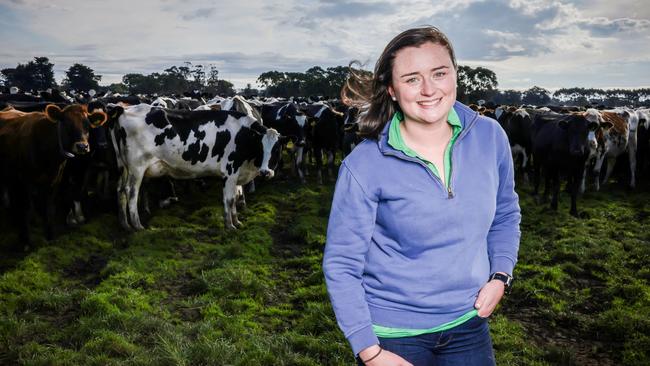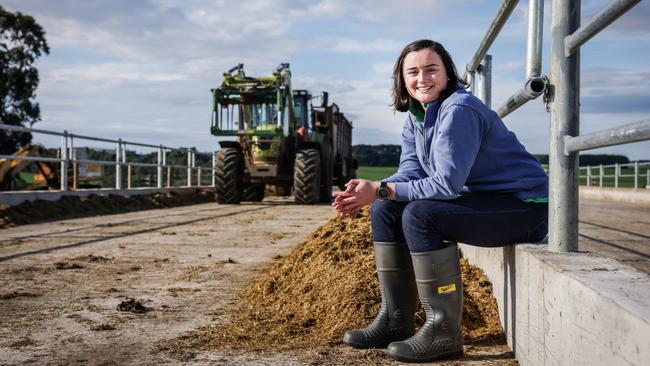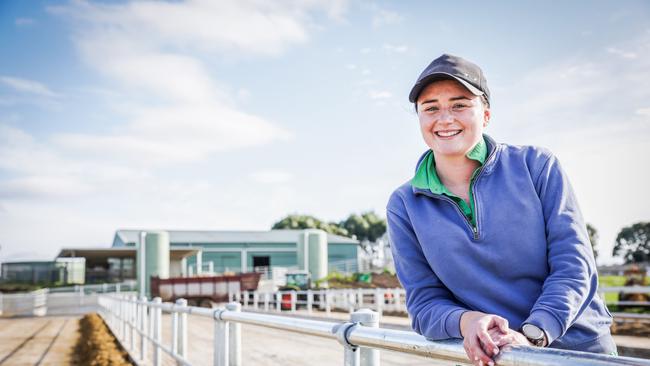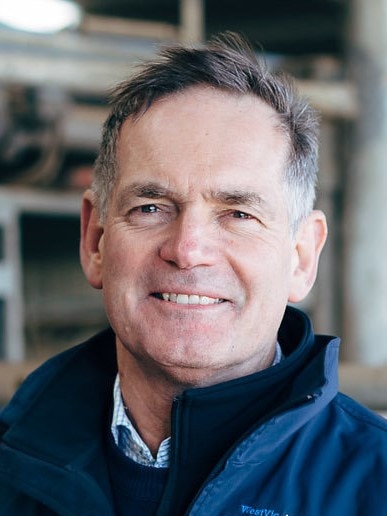Proud to be a Farmer: Terang dairy farmer Meg Kenna recruiting the next gen
Meg Kenna gave her university course the flick during Covid to work on a family farm. See why she wants others to make the switch too.

WHILE dairy workforce shortages have eased slightly with the welcome return of backpackers, farmers still say that finding and retaining staff, and skilling them to do the job remains one of their biggest management problems.
West Vic Dairy regional manager and executive officer Lindsay Ferguson said feedback from local farmers showed the greatest need in workplace recruitment was for skilled labour and management positions.
“We essentially still have a problem as do all employers across the southwest and regional Australia.
“The biggest need is for those in the second-in-command to manager level with a few years’ experience and a certificate or some academic training qualifications. That is providing some constraints to growth for farms, particularly for those who want to step back a bit – lifestyle is all the rage even with farming.”

CAMPAIGN ELEVATES DAIRY CAREER OPPORTUNITIES
Initially it wasn’t by choice that Meg Kenna came back to the family farm to work.
The 22-year-old spent her high school years planning to become a teacher but two weeks into her university degree, the pandemic hit and she quickly discovered online learning wasn’t for her.
“I had worked in hospitality before but it was shut down too so I started rearing calves and milking cows and I’m still here three and a half years later,” Meg said.
The family farm at Glenormiston North near Terang is run by her grandparents John and Jane and father, James, who milk 550 cows on 275ha. They produce up to 12,000 litres of milk a day on average during peak season.
“I love the work like feeding out. I love an afternoon in the tractor. It is good fun. No two days are the same and it is full of challenges,” Meg said.
Late last year, she successfully applied for the Proud to be a Farmer program – an initiative designed for dairy farm employees to help them understand the many opportunities the dairy industry had to offer.
Run by the Fonterra Australia Suppliers Council but open to all applicants no matter the processor they supplied, the industry mentoring program aimed to help attract, support and retain people in dairying. It included a three-day event with farm and factory visits as well as workshops led by industry stalwarts on different operating and financial structures, how to progress careers through to farm ownership, and the importance of looking after your mental health.

Meg said she enjoyed hearing from Fonterra and learning where milk went after the tanker drove out the gate.
“I really liked seeing inside the factory and how that works,” she said.
“It was really interesting. There was a lot of people doing a lot of things and big production lines. It blew my mind a bit and I much prefer to be where I am in the (supply) chain.”
Networking with industry leaders and fellow participants was a key part of the program.
“My favourite part was all the people that I met,” Meg said.
“I learnt a lot but the program was really awesome to get to meet people. I don’t like to put myself out there for things like that. I hop up, go to work and go home. I don’t really do much outside of that in relation to agriculture or talking to other farmers.
“The cohort from the program now keeps in touch and we speak to each other quite often.”
The turn of events and toe-dipping in farming has Meg contemplating a new career path in agriculture.
“I think it was meant to be. It has changed what I thought I would do in terms of an inside job for an outside job. Even if I’m not here, I will be in the ag industry somewhere.”
NATIONAL WORKER SHORTAGE CONTINUES
The National Dairy Farmer Survey released last month found 60 per cent of respondent farms businesses had been affected by difficulties finding employees.

Dairy Australia has invested heavily in a number of successful workplace attraction programs, including the appointment of staff in regional areas to help make employment agencies, schools, teachers and careers staff more aware of the opportunities that exist in the dairy industry.
“Attracting people to industries has to be complemented by employers who are up to the task in taking people on,” Mr Ferguson said.
“Our extension officers work to support farmers in developing their own skills as managers so they can retain the staff that they employ. Our farmers need to be careful in how they employ to ensure they comply with regulations and we run workshops and training sessions to help in that regard.”
Navigating online platforms to recruit employees was also essential for farmers.
“Gone are the days of putting an ad in the paper,” Mr Ferguson said.
“You have to be on social media. We have a jobs board on the (Dairy Australia) website but if you can’t navigate social media that makes it more difficult. It certainly is an area that has been modernised and farmers need to be savvy with that side of it as well.”
West Vic Dairy is co-organising an event with author, keynote speaker and international business consultant Mandy Johnson at Cobden on Friday (June 16) on helping dairy farmers “win the war for talent”.
West Vic Dairy extension officer Matt Wood said competition for quality employees across all industries was as fierce as ever. The information session aimed to provide dairy farmers with practical tools and techniques to attract the best people and then build a high performance workplace that they didn’t want to leave.
“Mandy has presented in our region before and was warmly received due to her no nonsense, practical approach to building a skilled, productive farm team,” Mr Wood said.
“She will discuss topics such as hidden motivators to attracting staff, screening out poor applicants to minimise staff turnover and how to performance manage underperforming employees.”




